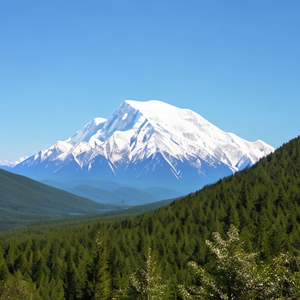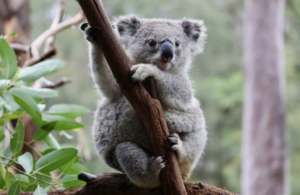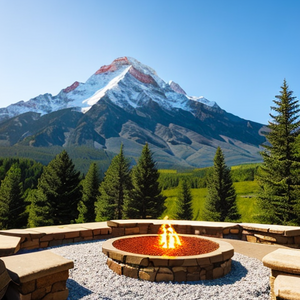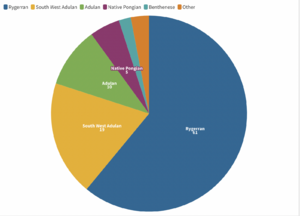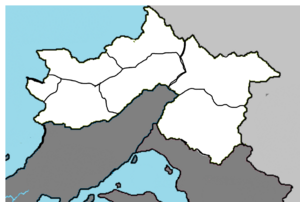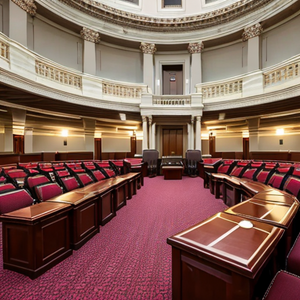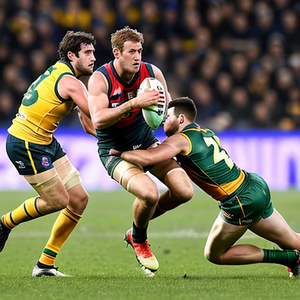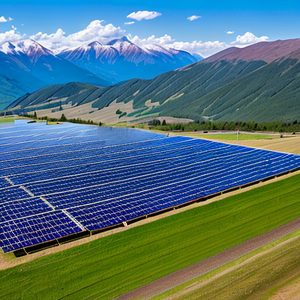Pongi
Federation Of Rygerrof | |
|---|---|
|
Flag | |
| Motto: "Standing United Together" | |
| Anthem: Forever Pongian | |
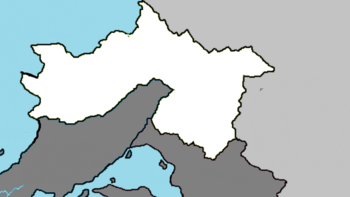 | |
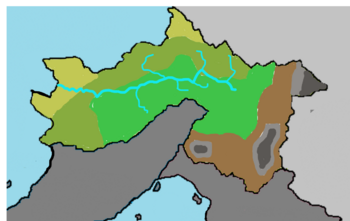 Geographic map of Pongi | |
| Capital | Monsvallis |
| Largest City | Rygerrof City |
| Official languages | Pongian, English |
| Recognised national languages | Pongian, English, Portuguese, Austrolisian, Indigenous Languages |
| Ethnic groups (2021) | Rygerran, Native Pongian, Elborran, Iobarayi |
| Demonym(s) | Pongian |
| Government | Parliamentary Republic |
• Prime Minister | Bretford Rintt |
• Governor of the Unions | William Etwyaip |
| Legislature | House of Assembly |
| Establishment | |
• Territory Formed | 1677 |
• Treaty of Mitangi | 1823 |
• Independence | 1929 |
| Area | |
• | 406,752 km2 (157,048 sq mi) |
| Population | |
• 2023 census | 9,328,000 |
• Density | 22.932/km2 (59.4/sq mi) |
| GDP (PPP) | 2023 estimate |
• Total | 388.2 Billion |
• Per capita | 41720.43 |
| HDI (2023) | .870 very high |
| Currency | Pongian Solar Micron (PSM) |
| Time zone | UTC-11:00 (Pongian Standard Time) |
| Date format | DD/MM/YY |
| Driving side | left |
The Federation of Rygerrof, also known as Pongi is a sovereign state that borders Nublarr, Iobaray and Alluna. It is well known for its outstanding mountains, lovely beachside cafes and beautiful scenery. It is located on the shore of the Elborra Bay. Pongi has 6 states, including Capital Districts. The states are Bareka'i, Warrung, Northbay, Gorges, Trevas and Paisaje. The meaning of the name "Pongi" is hook in an indigenous language, as it represents grabbing sovereignty and independence over colonialism.
Pongi is also a member of the Coalition of Crown Albatross and the Pan-Adulan Defense Coalition
History
Pre-Colonial
Pongi was home to several different groups of people during ancient periods, and it was surprisingly different to nearby countries, in the way it was more remote. People have inhabited the area surrounding Rygerrof City for millennia. Creating a seperate culture, the native people relied on the fresh water from streams and rivers, along with grain, for survival. Pongi was notably home to multiple empires, including the Julian Empire.
Independence
Pongi was founded in 1908 as a territory before an uprising happened in the Iobaray Empire in 1929. Soon, Pongi managed to gain full independence as a socialist government, with the country being purely coastal, on the Elborra Bay, before expanding inwards to now cover large mountain swaths on the West Adula Range. Uprisings across the country nearly caused the breakdown of the governmental system. A new capital was established, in Baranbay, which was soon moved to Monsvallis after the coup. Independence day is now celebrated on the 8th of January every year, showing Pongians pride and hope for the upcoming year.
World War
The World War was the main catalyst for Pongi's change from Socalism to People's Policies. Most Pongians supported the allies but the government supported the League Powers. This is because of the government's want to gain a coastal location on the shore of the bay (and to stay with power as it was unpopular), mostly giving aid to states in South Euronia. This greatly impacted relations between Pongi, Bentho and the nation's neighbours which healed in the subsequent years following the coup.
Pongian Revolution
The Pongian Revolution and the Battle for Rygerrof were aimed to create a stable government within Pongi and to ensure everyone gets free speech. However, this angered the Chancellor, Julie Meanace, who declared war on these protesters and upstaged a coup in order to remain in government. In shock, many notable Pongians combined to storm the capitol and potentially overthrow the government. As the world war raged on, many Pongians lacked food and died from famine. This uprising in capital Rygerrof led to the "so called" Battle for Rygerrof, where the army went on to defend the capitol. This attracted worldwide attention, for the enormity and shock this event caused within the region.
Soon, after heavy international pressures, Meanace agreed to elections and set up a new Pongian Assembly. However, she was revealed to be part of a secret family drug trafficking operation, which caused the people to riot again, in the disappointment of leadership that Meanace had given to them. The Army sided with the protesters, stormed the Capitol again and declared a revolution. This was the start of the "real" Federation of Pongi.
1961-1999
The new government, voted in many changes to the Pongian system, allowing for free and fair elections. But the lack of economic management from the ruling parties led to the 1959 crisis, where there was no industry within Pongi. There was no progress, and the government was stuck on ideas, before they realised tourism would bring in much needed money, along with energy. This was soon the start of the rebuild the nation had to go through to achieve success.
Some massive achievements from this time period is the brisk redevelopment of Pongi, upgrading infrastructure , public transport and improving education access to all. Improving literacy rates and infrastructure were main aims of the parties, as both main parties co operated together into the rebuild of Pongi, which strengthened the judicial system. By the 1990s, Pongi had somehow got most of the nation out of poverty, and had placed a bid for the 1999 Womens World Cup, which was a three bays world cup. The bid was successful, proving Pongi as developing hopefuls and growing national unity between the regions. However, there were still many sets of challenges for the emerging nation, as tourism was constraint to lowly infrastructure and poor spending had placed Pongi into deep debt, which is still an issue the nation manages today. There were no significant spending in the past eight out of ten budgets, showing that the government had indeed overloaded the economy and interest rates remained high.
2000-Present
The new millennium was a large turn for a highly developing nation, which had just hosted a very successful womens world cup, followed by multiple spending increases which boosted tourism to Pongi. Public education was at an all time high and new solar plants were constructed using Pongian materials, a pionner in renewable energy for Adula. This period brought a large change to the political landscape, with parties slowly dividing and taking contradicting stances. The 2 main parties have not appeared in the same coalition since 1987.
Pongi took leaps in poverty control, improving welfare and social housing for all. This has meant reducing wage gaps between men, women and different races. It put many things into stimulus, including the economy. Around this time period, most signs of the coup had been abolished within the political system. A flag change was presented as a referendum, with Pongians ditching the 1950's anchor mountain flag with a new navy ensign. The changes go effect on July 31st, 2023 and marks a new chapter in the nation's history.
Geography
Climate
Pongi has many different types of climate, with a varying mediterranean climate on the coast to colder oceanic - continental within the West Adula Alps. The coast is heavily defined by the bay effect, where everything is warmer due to the surrounding land on four sides. Most of the country is a cooler mediterranean climate due to the lower latitude and a smaller hot water stream coming towards Antartique makes the Monsvallis area hot, with tendencies for heavy winter rain. A lot of the country has variable weather, with Monsvallis just qualifying for a Mediterreanean climate while Oakpalm has an oceanic climate. Most of the rainfall comes up in a narrow slope towards Cadair, greening forests in the supposed "rain belt".
Geography
Pongi is a diverse country in terms of climate, providing crucial roles in the development of Pongi's culture. The 3 main regions within Pongi are the Four Bays, the Kawisena Forest and the Pongian Range.
The four bays are consisted of the entire Pongian coast, is a fairly warm region that gets most of its rain in winter, mostly coming from the equator. It is fairly jagged in geography, and also contains all 3 of Pongi's largest cities and undeveloped areas are often protected heavily by the government in the form of nature preserves. The little penguin is only found in the four bays region.
The Kawisena Forest is a rain-heavy, temperate area with most of it lying at the base of the mountains. It gets lots of rain thanks to a rain shadow provided by the mountains situated east, however banded narrowly as a rain shadow from Elborra blocks rain from the four bays. The Pongian Range is the most eastern and mountainous region in Pongi. It is significantly colder than the coasts, as the mountains are fairly tall, before the overall range shifts out toward Central Adula. Mount Rygerrof is Pongi's highest mountain, standing at 3,127 Meters (10,259 Feet).
Flora & Fauna
Pongi is home to a variety of different plants and animals. The national animal of Pongi, the Littius Penguiy (Little Penguin), is native alongside the entire coastline of the nation and sets up nests in huge, protected breeding areas alongside the coast as they migrate to Antartique. The Koalae is also native within the forests of the nation, however it has been impacted by climate change. Red Gums sit high into the deep forest along with many grass shrubs as flora enjoy rainfall all year around. Some other notable animals that reside in Pongi include the Kangora and the Loud Parakeet, which is one of Pongi's most known animals and a pride for Pongian patriotism.
Demographics
Religion
Pongi contains many different religions, including the unofficial religion SolarAnchor, which places belief that gods are here to promote equality and happiness within the human life, and does not utilise the belief of "not believing = hell", which has proven popular among the public, and is the official religion of the Native Pongians. Around 30% of people believe in Solar Anchor and head to meeting places for traditional ceremonies at least once per month.
The Church of Zian and other christian denominations including Protestant are Pongi's second largest religion, as around 25% of people believe in one christian denomination, including Protestanism containing the largest share. A large share of Pongi's population is Islam, with many mosques located across the cities and national laws banning discrimination against Islams. They contain around 8% of the population, however a growing share.
A study conducted in 2022 found that non religious people make up around 37% of the population and only 20% say they attend a place of worship regularly (ie. each week.) Pongi's government is fully secular, which is stated in Article 9 of the Pongian Constitution.
Population
Pongi is a surprisingly multicultural country, with many immigrants coming from nearby countries in Adula, seeking a better life. Around 30% of Pongians have 1 parent that was born outside of Pongi. The main ethnic groups are Rygerran, Native Pongian (who come second), Elborran and Iobarayi. The main ethinic groups coming outside the former Iobaray Empire borders are of Benthenese desent. Rygerran people consist of 61% of the population, whilst South West Adulan people consist of 19%. Other Adulan peoples make up 10% of Pongi's population, and the recovering native Pongian tribes stand at 5%. The largest group outside of Adula is Benthenese, with 2%.
Pongi's has a population of 9.38 Million people, according to the 2023 Census. The Census is conducted every 5 years to calculate the amount of people residing in Pongi. This marks a massive growth from the previous 2018 census, which came in at 8.9 million. This is mostly due to migration and Pongi's "opening up" to the outside world and loosening border restrictions. The number of people born in Pongi narrowly increased, as the fertility rate drops slightly from 2.02 to 1.97. Like most middle countries, the average age of Pongi is sitting at 28.9 years, a slight increase from 27.7 years as development continues. The population is set to grow from 9.4 Million people to 11.5 Million people in 2050.
States
| State | Postal abbrev. |
Capital | Population | Senate Seats | Legislative Districts |
|---|---|---|---|---|---|
| Pongian Capital Territory | PCT | Monsvallis | 1,700,000 | 11 | 7 |
| Warrung | WRU | Rygerrof City | 2,750,000 | 18 | 10 |
| Pranorte | PNT | Baranbay | 1,080,000 | 7 | 5 |
| Bareka'i | BKI | Oakpalm | 1,210,000 | 8 | 5 |
| Trevas | TRV | Brabram | 790,000 | 5 | 3 |
| Paisaje | PSJ | Mosatt | 670,000 | 5 | 2 |
| Gorges | GOR | Barcampa | 950,000 | 6 | 4 |
Politics
Legislature
Parties
There are many parties within the state of Pongi. They have a justice to serve the people and put their interests first, according to the Pongian Constitution. This means there are many medium sized parties and independents, even with the 2 big parties still holding most seats within the legislature.
The two main parties are Pongian Labour Party and the National Patriot Party, which usually are the parties holding the government together. Currently there are 356 seats in the Parliament, with half of those belonging to the large state representation, which splits up seats to individual districts by population. The other half goes to local Member of Parliament, which is a stage for a local council / district on the national level.
Currently, Bretford Rintt is the 8th Prime Minister of the 3rd Federation, which started in 1988. Elections are held on a yearly basis, with the midterm year electing half of the parliament, while cabinet years elect the prime minister and the rest of the legislature. The rules will change to an election every 3 years, unless a snap election is called. This means midterms will be abolished and this change, voted by the people, will smooth out elections. Local elections in the 1st year, State elections in the 2nd and Federal elections in the 3rd.
William Etwyaip is the first Governor of the Unions to be of Indegenous Pongi descent, coming from the Ensvellp Tribe in Northern Pongi. The Liberal Democrats held the prime ministerial position for the first time in 2022 after the election of Rintt.
Government
In Pongi, the government is democratically elected, with runoff preferential voting used across all districts. In the National Assembly, 173 seats go to individual districts, which are large and get spilt off by population. In addition, the other half will go to the member of parliament, which represents local areas individually. There is only one in the council / area, as it is used for local representation. Pongi goes through a 3-year election cycle, in which the 1st year are the local elections, which are held on different days across the country, usually going from September - December. The second year are the state elections, which means voters have to vote for state representatives. The final year of the election cycle is arguably the most important. It contains the race for the local MPs, District Representatives and the Prime Ministerial Election. PMs can only be MPs and usually a new prime minister is declared. Usually the DR Elections get held half a year before the Prime Ministerial Election.
In addition, the Senate is made up of higher ups for general stability. The nation is split off into 3 distinct voting districts, and in states there are multiple people running. There are many possible preferences, which uses instant runoff voting to determine the winners. Usually everyone in the state votes for the same people no matter what. Senators serve a three year term and can serve for a maximum of 10 years.
Prime Minister
The Prime Minister, Bretford Rintt is part of the Alternative Party, representing Congwarrang North in the House of Representatives. He was elected in 2022 and is set for reelection in 2025.
The Deputy Prime Minister, Ranford Tarran is part of the Patriot Party, representing Mosatt Hills.
Foreign Relations
Pongi has many diplomatic relations with different countries on Iearth. Monsvallis is home to multiple embassies overseen by the Pongian Government. After development, Pongi has opened up with many nations across the world and strengthening its ties with neighbours. Pongi advocates for the democratic process, enviromentalism and personal freedom. Pongi's international relations have been guided by their main policies of common sense, multilateralism and respect for other nations.
Pongi has 2 free trade deals, with Bentho and Greater Normark. Bentho is Pongi's closest ally, thanks to similarities in government, historical relations and global events.
Military
Due to a relatively peaceful relationship with neighbours along with the remote location, Pongi does not have a large military. However, the Pongian Armed Forces is the main operating arm of the military, which was founded in 1931 after the collapse of the Iobaray Empire. This in turn built up a medium sized army, with a commanding amount of naval ships and fighter jets. Pongi has struggled significantly with the recruitment of people to the army, but with new university incentives and a free degree on offer, numbers are rising. Topping over 200,000 combined soldiers, in which around 50,000 are currently active, Pongi may have the means to fortify itself enough incase of an invasion.
Pongi contains many types of new equipment to replace ageing carriers, aircraft and tanks. The Pongian Navy patrols Pongi's section of the Elborra Bay, which is easily one of the largest navies in the region, even without a waterfront position. The Navy also has 1 Aircraft Carriers, rightfully named the RTs Commander. The Army Force patrols Pongi's borders with international neighbours, keeping peace within the SW Adulan Region. This includes mandatory patrols of the high mountains, installing new equipment across the plains and training soldiers to help with combat duties. The Pongian Air Force was founded alongside the navy in 1936. The nation is also a member of the PADC, joining on the 11th of July, 2023
The army will serve, protect, uphold Pongian values and the integrity of the constitution, as defenders of the land.
Culture
Sport
There are many different sports within Pongi. Usually, there are a few main sports vying for country dominance, in which it has become an interesting tussle between the main football codes. There are many casual sports that Pongians do. This may include surfing, volleyball and skiing, or maybe team sports like Pongipush.
Pongipush is popular within the north of the nation. It is known for its renowned intensity in contest and free flowing game out. There is a league called the National Pongipush League and many lower leagues. Pongipush has expanded into Normark and Bentho as immigrants bring the game with them.
Rugby Union is Pongi's 2nd most popular sport. The Pongian Rugby Team placed 4th in the 2023 overall ranking, which coincided with hosting the IRL for the first time.
Soccer is one of the most popular women's sports. The nation has a strong women's world cup team, and since the 1999 Women's World Cup, participation rates have skyrocketed. Now the Sporting Association is planning for a men's league, to help soccer succeed as a double-gender sport.
Art
Pongi has a cultured art industry, being home to many famous painters and digital artists. Art is known to be a meditation form in Pongi, as it is supposed to help you relax. There are many famous paintings scattered within the nation, but the most famous is a painting made by Carlos Tenzwer, which is a painting of Pongi's 2 national animals, the little penguin and the snow leopard, representing 2 different areas in unity.
Cuisine
A traditional dish is the Gum Leaf and Raspberry salad, typically served at traditional Pongian resturants.
Economy
Pongi's economy is mainly socialist, with the government controlling most assets and businesses. Private industry is allowed on a storefront basis, with individual small businesses signing up to the government's Economy 2 scheme (or other chosen scheme) to receive a license (with fairly minimal conditions), then operating with many main freedoms associated with capitalism. 1 Micron is worth around Z$0.87
Trade
Pongi's largest trading partner is Bentho, owing to close relations and different, exchangeable and tradeable industries. Pongi also maintains a free trade relationship with Greater Normark. These international relationships have helped fuelled Pongi's economy as a small, remote Adulan nation. Most of Pongian exports are solar panel mechanics and rail ballast, with smaller industries building trade corridors.
Energy
Pongi is a small Adulan nation known for its early sustainable energy commitments. Alpine Solar is a government-owned company, witch supplies solar panels to buildings around the nation, along with setting up new solar farms in the mountains. In the year 2019, the former Labour government set a new net zero goal of 2036, with installing new wind and solar projects. In 2019, the most predominant energy source was solar power, which accounted for 71% of total energy supplied. Wind power provided 10% of total energy, as other renewable sources (eg. hydropower and geothermal) totalled 9%. Non renewable gas constituted a total of ten percent of hydrocarbons such as coal and gas, which were needed to keep operating heavy industrial plants, which will be converted to geothermal or sustainable timber.
After the latest election, the new government sought to move forward the net zero goal to 2031 as an election promise and to further increase battery efficient systems. Implementing a strict carbon tax from 2022, all forms of greenhouse gases released by anything other than heavy industry with concur huge fines. The government has however upgraded general infrastructure, such as public transport and incentives for battery vehicles. Alpine Solar is considered Pongi's most recognisable government owned company, which builds solar panels in SW Adula and sponsors large sporting teams.
Due to the urgency of climate inaction, Pongi focused on inventing newer, renewable ways to power heavy industry. Helping citizens cover costs for new energy-efficient solar panels and water systems, it is known as an effective and popular solution for many older houses in the nation. All residential and commercial emissions are set to be eliminated from 2025, with larger industries going carbon free by the set date of 2031. This scheme has helped not only Pongi's push towards renewables, but to saving the rare, important red gum forests, which have been sitting near heavy industrial plants for decades and nearly went extinct.
Transit
Pongi contains a large, self built public transportation network, boasting giant train and streetcar systems across the nation. The country in particular is a giant train and tram builder, which contributes to the nations economy. Government subsided companies like Baslastom build sustainable and environmentally friendly commuter transport, highlighting the history of rail transit and the nation's efforts to stay within local boundaries when coming to public transit is somewhat commendable. Pongi has a long history with rail, as the bayside location of the country made it a feeder for many inland Adulan countries trying to trade via the oceans. There is a complex web of different public transit systems which serve many cities and the countryside.
Tourism
Tourism is a huge sector of Pongi's economy, contributing to the continued growth of the nation and its development. The nation is fortunate to contain precious landscapes, natural beauty, a wide range of cultural heritage and being the heart of South-West Adula. Pongi has become a premier tourist destination, mainly known for its uniqueness and diverse range of geographic features. The industry generates significant amounts of money for the government and creates new job opportunities.
As a key pillar of the economy, Tourism generates around 1.5 billion microns per year, accounting for a small yet significant portion of Pongi's GDP. It is known that tourists boost economic growth, especially in regional areas, as they spend money which helps businesses around the nation.

